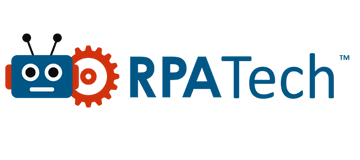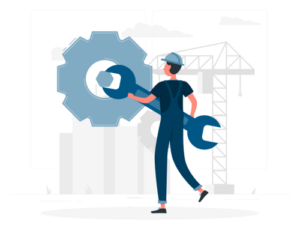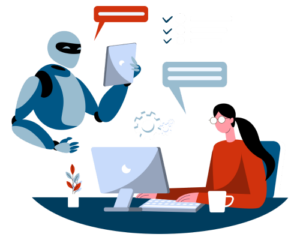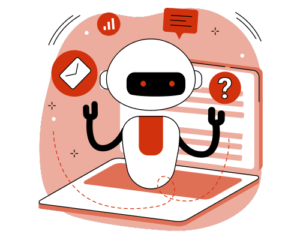In the rapidly evolving landscape of technology, two terms that often come up in discussions are “Artificial Intelligence” (AI) and “Intelligent Automation.” While both are cutting-edge technologies with the potential to revolutionize various industries, it’s essential to recognize that they serve distinct purposes and possess unique characteristics. In this comprehensive guide, we’ll delve into the differences between AI and Intelligent Automation, shedding light on what sets them apart.
What is Artificial Intelligence (AI)?
Artificial Intelligence, often abbreviated as AI, is a field of computer science that aims to create machines capable of performing tasks that typically require human intelligence. The core idea behind AI is to enable machines to simulate human-like thinking processes and problem-solving abilities. Here are some key aspects of AI:
Learning and Adaptation
One of the fundamental features of AI is its ability to learn and adapt from data. Machine Learning, a subset of AI, allows systems to recognize patterns, make predictions, and improve their performance over time.
Human-Like Decision-Making
AI systems can make decisions, often complex ones, by analyzing data and drawing conclusions. This capability is particularly valuable in areas like healthcare, finance, and autonomous vehicles.
Natural Language Processing (NLP)
NLP is a subfield of AI that focuses on enabling machines to understand, interpret, and generate human language. This has led to innovations like virtual assistants and chatbots.
Examples of AI Applications
- Recommendation Systems: Netflix’s movie recommendations are powered by AI algorithms that analyze your viewing history to suggest relevant content.
- Self-Driving Cars: Companies like Tesla employ AI to navigate and make real-time driving decisions.
- Medical Diagnosis: AI systems can assist doctors in diagnosing diseases by analyzing medical images and patient data.
What is Intelligent Automation?
Intelligent Automation is another technological realm, but it differs from AI in several significant ways. It refers to the use of automation technology with integrated cognitive capabilities to perform tasks, often repetitive and rule-based, in a more intelligent and efficient manner. Here’s what you need to know about Intelligent Automation:
Rule-Based Automation
Intelligent Automation systems rely on predefined rules and structured data to execute tasks. This means they follow specific instructions and workflows, making them suitable for repetitive processes.
Enhanced Efficiency
The primary goal of Intelligent Automation is to improve operational efficiency. By automating routine tasks, organizations can save time and resources.
Human-Automation Collaboration
Unlike AI, which can operate independently, Intelligent Automation often collaborates with human workers. It can assist employees by handling repetitive tasks, allowing them to focus on more complex and creative aspects of their jobs.
Examples of Intelligent Automation Applications
- Robotic Process Automation (RPA): In business operations, RPA bots can automate data entry, invoice processing, and other rule-based tasks.
- Chatbots: While AI-powered chatbots can have natural language understanding, some chatbots are rule-based and provide automated responses based on predefined guidelines.
- Data Entry and Extraction: Intelligent Automation tools can extract and input data from documents, such as invoices or forms.
Key Differences Between AI and Intelligent Automation
Now that we’ve outlined the basics of AI and Intelligent Automation, let’s compare them based on several critical aspects:
1. Decision-Making Capabilities
– AI: AI is designed to make complex, data-driven decisions. It can analyze vast datasets and adapt its decision-making processes over time.
– Intelligent Automation: While it can automate tasks efficiently, it follows predefined rules and lacks the adaptive decision-making capabilities of AI.
2. Human Interaction
– AI: AI systems can interact with humans through natural language processing, enabling chatbots and virtual assistants.
– Intelligent Automation: Typically, it collaborates with humans and assists in completing tasks rather than directly engaging in conversations.
3. Flexibility
– AI: AI systems are flexible and can be applied to a wide range of tasks, making them versatile and suitable for various industries.
– Intelligent Automation: It is best suited for repetitive, rule-based processes and may not be as adaptable to diverse tasks.
4. Learning
– AI: AI systems can learn from data, adapt, and improve their performance. This is a significant advantage when handling dynamic and evolving tasks.
– Intelligent Automation: It doesn’t possess learning capabilities and relies on predefined rules and structures.
5. Use Cases
– AI: Common AI applications include recommendation systems, autonomous vehicles, and natural language processing.
– Intelligent Automation: It is often applied in business operations, finance, and customer service, focusing on process optimization and efficiency.
When to Choose AI or Intelligent Automation
The decision to implement AI or Intelligent Automation depends on your specific business needs and goals. Here are some scenarios where each technology shines:
Choose AI When:
– You need to make complex, data-driven decisions.
– The tasks involve understanding and generating natural language.
– Adaptability and learning from data are essential.
Choose Intelligent Automation When:
– Tasks are repetitive and rule-based, such as data entry or invoice processing.
– You want to enhance operational efficiency.
– Collaboration between humans and automation is required.
Conclusion
In summary, while both Artificial Intelligence and Intelligent Automation are groundbreaking technologies, they serve distinct purposes and have different characteristics. AI excels in complex decision-making, adaptability, and human-like interactions, while Intelligent Automation is designed for rule-based, repetitive tasks with a focus on efficiency.
Understanding these differences is crucial for businesses and organizations looking to leverage these technologies to their advantage, as it helps them make informed decisions and select the right technology for their specific needs. Ultimately, the choice between AI and Intelligent Automation should align with your objectives and the nature of the tasks at hand.




